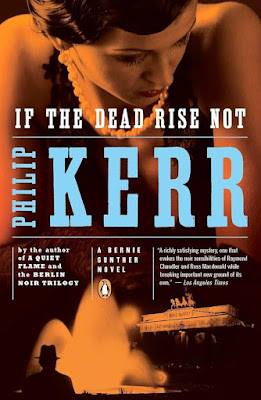(36. - 1219) The Wealth of Shadows by Graham Moore - World War II is about to begin. Ansel Luxford is a quiet tax attorney in Minneapolis. He has a loving wife, Angela, and a 2 year old daughter. He is a clever man. He understands statistics, especially economic data. Ansel and Angela have a passion uncommon in the America of 1939. Amidst the indifferent and the isolationists of the U.S.A. they are passionately anti-Nazi.
Ansel is recruited to join a secret team that will fight the Nazis. It is an unlikely band of brothers and a sister to go to war. They are lawyers, accountants, economists and professors. Not a bullet will be fired nor a bomb dropped by them but in the words of their leader, Harry Dexter White:
“We’re going to crash the German economy.”
I was hooked. As a lawyer who has spent his life fighting through words I loved the premise of paper warriors taking on the Nazis.
The team will need vast amounts of statistical information to go to economic war. The greatest source will be German. The Reich Statistical Office is leading the world in compiling economic statistics about Germany. Under Hjalmer Schacht, the Dark Wizard of Global Finance, an army of German statisticians is analyzing the gathered data.
Through personal contacts White has been able to get hundreds of boxes of German data.
They are blandly called the Research Department.
Germany has been rapidly expanding its military for 5 years and is now at war. The official records neither show large increases in the money supply nor huge amounts of borrowing by the government.
Ansel is called upon, as the economic storyteller of the Department (I think lawyers are good storytellers), to explain to FDR’s trusted economic adviser and friend, Secretary of the Treasury Henry Morgenthau Jr. how the Nazis are financing their war.
Ansel sets out how Schacht created Mefo bonds which are issued by a company owned by the government. Banks are required to purchase the bonds which pay 4% interest which they then pay to the accounts of their depositors but the depositors cannot take out the money and repayment of principal keeps being extended by the government. The Mefo bonds are a shadow currency.
The flaws in the scheme are consumer spending and imports. German citizens at some point will want to use the money in their accounts to buy goods. To pay for imports the Nazis are looting and stealing from Jews, Czechs and now Poles. The Nazis have to keep expanding their empire to pay for the war.
Having identified the weaknesses in the Nazi economy, how will the Department exploit the weaknesses?
As the Department plots Angela gets a job as a secretary at the FBI. Ansel and Angela solemnly vow not to reveal to the other any secret information they get at work. The vow lasts barely a day.
Angela hears the Soviets have a spy inside the Department. They agree to keep the shared knowledge of the spy secret from both the FBI and the Department.
White then tasks the Department with developing a strategy which will allow FDR to transfer American weapons to Britain and France without breaching The Neutrality Act. To give or sell the weapons would breach the Act unless the same offers were made to Germany.
The greatest opposition to The Department comes from fascists within the State Department. A bureaucratic war ensues.
Ansel and White meet with Lord John Maynard Keynes, the most famous economist of the first half of the 20th Century.
There is a substantial discussion on the history and use of money which was getting tedious. The essence of the analysis was that money is based on trust that it will have the value tomorrow that it has today.
Fortunately, the book livened up again as the Nazis sweep across Western Europe in 1940. The Department plots to damage the Nazis and allow financing of vast amounts of weapons to be manufactured in the U.S.
Ansel and Angela are charmed by Keynes and his Russian wife, Lydia.
The personality clashes between White and Keynes, the conflicts over monetary policies, the manipulation of statutes to allow governments to spend billions of 1940’s money are tense and fascinating. I was reminded of how Stanford law professor, Paul Goldstein, wrote three compelling works of mystery fiction involving patent law.
As long as a work of fiction involves betrayals and large amounts of money it has a good chance of success.
What was most surprising was the effort at The Department, before the U.S. was even a part of of WW II, to work on creating a global economic policy for the era after the war has ended.
Many historians talk about the importance of U.S. military might ensuring the Axis powers would be defeated. Few discuss how America crushed German and Japanese access to money and goods.
The book climaxes with the meeting at Bretton Woods in 1944 to work out the post-war financial structure. Will the planned World Bank and the International Monetary Fund be supplied with dollars (the plan of Harry and Ansel) or Bancor (an international currency governed in London by bureaucrats like its proposer, Keynes).
As at any great moment in history the decisions are made by a few men (now but not then it is just as likely to include women). Harry and Keynes face off at 2:00 in the morning with Ansel trying to moderate. The arguments are ferocious. Harry believes American generosity during the war to Britain gives the U.S. the edge. The Britons counter with a strategic move of their own involving Amerca. You will need to read the book to find out what happened.
The future of money in the world is to be decided by a pair of intractable subtle adversaries. There are further meetings and carefully worded documents.
The book demonstrates how important words are in determining the fate of the world.




